Editorial
Gold Bull to Reveal Inflation
14 May 2003
a currency & gold market analysis
by Ed Bugos
| Print Copy | ||
| Today's Highlights: | ||
| Regulatory failures aren't the problem, but more regulations can add... | ||
| What the hell are we going to do with our gold stocks? | ||
| Treasuries price deflation, all other markets price inflation | ||
| Wall Street fails to understand nature / risk of dollar devaluation | ||
| Will markets believe the PPI/CPI figures this week? | ||
| Targets for the Dow, Gold, Silver, etc. | ||
| Deflation and weak dollar are contradictory | ||
The SEC met in a roundtable this morning to discuss regulating the hedge fund industry.
Investors must be demanding it.
Though I don't know any that would throw their money at something without knowing what they're throwing their money at. Personally, I'd like to keep it that way.
But the government insists on breeding sheep, if you will. Investors shouldn't have to do their own due diligence is their motto. Indeed, for their manipulations and monetary schemes to work, they need participants willing to believe they can make the maximum amount of money with a minimum amount of work.
So I'm glad to see the street's top cops producing results!
But how come all the other regulations don't work? How many times are they gonna' rebuild that chinese wall (Wall Street metaphor for regulatory division between research and investment banking conflicts) for instance? How come unscrupulous promotional activities spread to record levels of corruption during the nineties, and on exchanges that were said to be well regulated?
How come indeed. How about because regulation is not main the problem in the first place.
Nevertheless, industry insiders expect the costs for hedge fund start ups to rise. So you see, the regulation itself simply transfers the cost from the lazy investor to the entrepreneur. But that's not even accurate, because in the long run, it costs the investor even more, because the powerful can always get around the rules.
Welcome to the new world order.
Enough of that. Nobody cares anyway, right?
What the Hell are We Going to Do with
our Gold Stocks?
Gold prices are generally past their July 2002 peak, extending their bull
market trend, while gold stocks seem like they've gone nowhere since then.
Meanwhile, bonds have made new highs (in price), the Dow is engaging in its third countertrend rally off last year's bottom in an attempt to reverse the bear market, and the speculative Nasdaq market averages made higher intermediate highs within a primary bear market (channel). The bulls say it's because the weak dollar is going to stimulate the economy, but not inflation.
Well, we all know most of them couldn't tell inflation from a flying saucer.
That's precisely the problem of course. That's why your gold stocks aren't going higher - because the process of discovery is young.
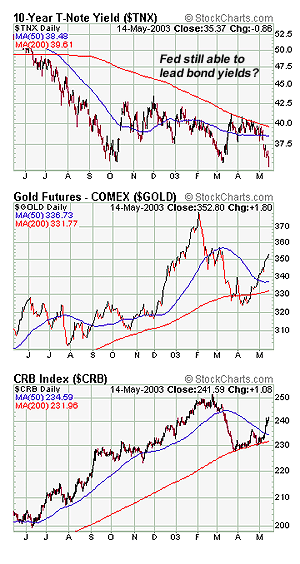 Your
local central banker knows this, which is one reason why the disinflation
noise is so loud these past few weeks, and particularly after last week's
FOMC statement prodding it along. They probably already know the PPI/CPI
figures this week are likely going to reflect March's drop in energy
prices, and other commodities.
Your
local central banker knows this, which is one reason why the disinflation
noise is so loud these past few weeks, and particularly after last week's
FOMC statement prodding it along. They probably already know the PPI/CPI
figures this week are likely going to reflect March's drop in energy
prices, and other commodities.
In fact, that's the impetus behind the new high in bond prices in my view - the bond market's buying the disinflation propaganda hook, line, and sinker.
I bet core prices won't be down as much as the headline number, but that the headline number will be the bulls' focus - even as it's ignored in months when it rises.
Still, how do you reconcile, sensibly, the combination of rapidly increasing money supplies / credit, a falling dollar, rising commodity prices with the disinflation (and lower yields) theme at the same time?
There is one way. There is the hope that two years worth of Fed rate cuts will finally kick in to boost corporate profits, and trigger a new bull market in equity valuations.
In other words, there's still hope the inflation (easy money) will work, instead of break down, despite the fact that it's breaking down right in front of our faces.
So gullible are the bulls that this dollar devaluation is a deliberate policy maneuver, rather than the product of a market saying the dollar's overvalued, that they continue to price in the optimistic stock market outcomes.
The difference is enormous.
For, in the former case the Fed is seen to have control over inflation / prices. And bond traders work with the Fed rather than against it, at least so long as they believe it anyway.
That means, essentially, when the Fed implies interest rates can still be lowered, traders believe it.
They do.
Every price rise over the past year is explained in terms of a war premium, or it's isolated to energy costs. The weak dollar is seen to be deliberated, and promises to stimulate only the right prices.
The problem is the weak dollar is not deliberated, and the Fed doesn't have half the control over inflation the bond market thinks it does.
Yet it's that very delusion - that there's disinflation or that inflation is under control - which we'd argue has fueled Wall Street's several comeback attempts over the past 10 months, by pressuring bond yields.
Correlate the timing of the lows in Bond yields (above) to the Dow's comeback attempts in the same period, and you'll understand why Wall Street's bear market has stalled. The lows in yield precede every rally, except the last low came during the Dow's recent rally.
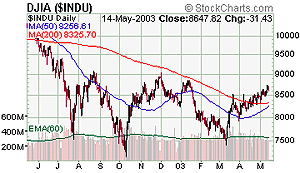 The
stock and bond markets have generally squared off since last summer. When
stock prices rise, bond yields do, and when stock prices fall, bond yields
have.
The
stock and bond markets have generally squared off since last summer. When
stock prices rise, bond yields do, and when stock prices fall, bond yields
have.
We've noted this relationship several times in the past, but expected the dollar's bear market to break it in favor of the bears - both stock and bond.
Instead, perversely, the dollar's bear market combined with the Fed's disinflation propaganda seems to have kept optimism for earnings high, while the outlook for yields low. The result has been a decoupling of that relationship in the bulls' favor.
In other words, rising stock prices didn't inspire rising yields, like they normally have - since 1998 anyway. Indeed, while analysts up their earnings outlooks for Wall Street for the remainder of the year, the press was simultaneously reporting on the prospects for deflation.
So as bond yields fall, the accompanying uptick in earnings outlooks for the rest of the year makes equities look as cheap (relative to bond yields) as they've been in more than 10 years.
So if you're looking for reasons as to why your gold shares haven't performed over the past year despite feeling increasingly right in your outlook, look no further than the fact that bond traders obviously still don't believe there's inflation, or they don't believe it'll erode their income, or they are convinced the right argument is deflation.
Because if that's the case, why not buy other stocks? They're cheap indeed, provided bond yields remain low, and inflation is really under control like the Fed says it is.
Of course, bond yields aren't sustainable at these 45 year lows unless there really is going to be deflation.
But if there was going to be deflation, consider this - the Dow may be cheap in relation to yields, but it would be expensive relative to earnings.
My point here is there's no deflation priced into the stock market, the dollar, the commodity markets, or much of anywhere for that matter except for the Treasury market, which is trading more like a corporate bond than a government bond anyway.
Unfortunately for the Fed, dollar weakness translates into an environment where the prices that benefit from the inflation are commodity prices at first, then employment costs, then pricing power returns in many industries.
Profits will undoubtedly rise, but they'll increasingly be recognized as nominal.
The sectors most likely to benefit from an increase in earnings from dollar devaluation are the commodity sectors, because they are less overvalued than the stocks of companies in the export business, and also because commodity prices rise first in such an environment.
It's really simple. To think that dollar devaluation could result in a benign healing of the current account deficit and stimulate technology earnings over commodity earnings is a delusion that I think Wall Street's bulls are going to have to face the truth on soon.
So that's where gold share investors are left. The inflation, they know is there. And the evidence has been piling up. But the critical moment - or the point of recognition if you will - has been evasive. Moreover, if it all somehow resulted in a new bull market for the Dow, strong enough to turn the dollar back up, that moment could be pushed further away perhaps. That's what I estimate is holding back the sector.
Here's the thing though.
As more people realize the inflation is endless, gold prices will get stronger and stronger, as they've been for the past few years, and for the past few weeks in fact. And as they get stronger, it means that participants are devaluing the dollar, or that their dollar outlook is increasingly bearish, which means there's too many dollars. It's that simple. Even the Kudlowians know that rising gold prices mean there's inflation.
What they probably don't understand is that it really means there's an increasing perception that the inflation is endless, and confidence in the economy/currency is dropping.
We know that chances are the PPI number is going to be weak this week. But the question is whether people will buy it, or not. I'd like to think the markets will place more weight on real time developments than those figures in determining the inflation outlook. But I fear what might happen is that the figures will boost the Fed's disinflation theme, depress gold prices, and boost the dollar.
In other words, I fear the market will keep believing the Fed's data. Yet we've been heartened by the fact that gold prices have been strong all week long amid ongoing dollar weakness. So far, at least by those markets, participants aren't believing the Fed's claims. We'll see if that changes by Friday I suspect.
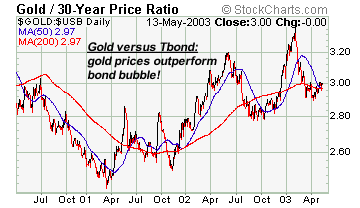 The
key to the gold share market then, at this point, is whether the new highs
in bond prices this week stimulate further gold strength and dollar weakness,
or whether they can break the Dow out of this 10 month range, and strengthen
the dollar.
The
key to the gold share market then, at this point, is whether the new highs
in bond prices this week stimulate further gold strength and dollar weakness,
or whether they can break the Dow out of this 10 month range, and strengthen
the dollar.
One way or another, the bond is setting itself up for a big fall. If the Dow breaks out, for instance, and markets believe that the resulting rise in yields is the result of rising stock values, it's possible that the gold sector would suffer.
But to take that bet, I think you'd have to believe one of the following:
- there's no inflation at the source of it all
- earnings will come back so strong that a rise equity values could tolerate a rise in yield
On the other hand, if gold shares rose on a break out in the Dow, it would mean to us that the gold market doesn't believe the Dow's move sustainable.
The higher high in the Nasdaq last week has got some gold sector investors concerned that the broader market averages might follow. But so far the idea hasn't attracted many suitors. Even some of the old bulls seem to distrust the current move on account that the leadership is speculative.
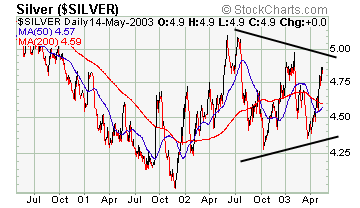 Personally,
I don't think the Dow will break out, and if it does by some chance, I
doubt the move could attract enough believers, or come with the earnings,
to sustain it.
Personally,
I don't think the Dow will break out, and if it does by some chance, I
doubt the move could attract enough believers, or come with the earnings,
to sustain it.
When we look at the charts, what we see is that the dollar is in a solid downtrend; gold and silver prices continue to be under accumulation and are currently poised to break out themselves; and that all stocks - gold stocks included - have pretty much gone nowhere since last June/July.
But when we look at a chart of the Dow, and a chart of the AMEX Gold bugs index, we note that the Dow is still confined to a bear market sequence and that gold stocks are still controlled by a bullish sequence - see charts below.
Moreover, while the nature of the Dow pattern (June to May) appears rather neutral overall, the gold stock charts reflect a degree of accumulation - note the ascending triangle in the chart of the HUI below.
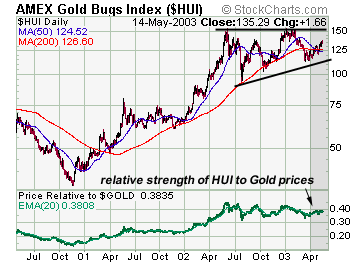 Still,
investors have grown impatient. Understandably so, since the evidence
of inflation is quite conspicuous.
Still,
investors have grown impatient. Understandably so, since the evidence
of inflation is quite conspicuous.
But I think it's not quite correct to criticize the lack of leadership by gold shares in the gold price move to $390 earlier this year.
I think it's important to recognize that while the AMEX gold bugs index reversed a primary bear market sequence in June 2002, gold prices didn't reveal a primary bullish sequence until December.
In other words, the gold price spike was catch up. Now the question is whether it will continue.
The bears tested bullish support for both gold and gold shares in March. It held. It's correct I think to now expect gold shares to lead again as the outlook for gold prices increasingly brightens.
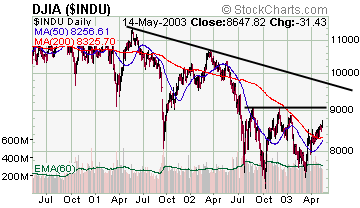 And
they have been outperforming gold prices to a degree.
And
they have been outperforming gold prices to a degree.
So our outlook is this:
The Dow may or may not break out, but gold shares will, and they'll break out along with gold and silver prices.
If the Dow does break out in such an environment, its back will break on the first hint of a serious bond market slide (or higher interest rates).
Our six to twelve month targets then are as follows:
- HUI = 200 to 230
- DJIA = 5000 to 7000
- Gold = $425 to $475
- Silver = $6 to $7
- Dollar/Yen = 100 to 105
- Dollar Index = 85 to 90
Can't Have Deflation Amid Weak Currency,
Sorry...
I think if you're bullish on gold and expect deflation at the same time,
what it means is you're afraid of being right.
If you're bullish on gold, you have to be bearish on the dollar (unless you're not that bullish in the first place). If you expect deflation, however, what you expect is a contracting stock of money to result in an increasing value for the currency, rather than for goods or services.
The prices for goods and services, as you know, are impacted by changes in the value of the currency as well as changes in demand and supply.
Consider it this way. There are two markets operating simultaneously. One where the demand and supply for a good or service interact to produce value for it, and another where the demand and supply for money (or currency) interact to produce value for it. Together they express as price.
They aren't wholly independent of each other, but can be theoretically considered that way. Moreover, it's just as correct to say one dollar is worth a cheap beer, as it is to say a cheap beer costs one dollar. But today, we've been trained to ignore the former proposition. Anyway, the point is the dollar isn't worth a cheap beer!
The only time an increase in money supply doesn't result in an immediate devaluation of the currency is when participants are convinced demand for money is growing as fast as its supply.
In any case, how do you have deflation if you accept, as we do, that the currency is overvalued?
1) either you're convinced that money supply
will somehow contract, or
2) you mean deflation in some sectors and inflation in others.
Number 1 is easy. It can't contract. Good luck. It never has, and if they run out of ideas on how to increase money supply, no problemo, we've can send 'em some. The only string the Fed's pushing on is the one tied to your leg, and they're pulling not pushing it.
I've asked readers to go out and find us a period since FDR abandoned the (phony) gold standard in 1934 where the stock of money contracted without briskly recovering. I've never heard back from anyone, and I couldn't find the evidence myself. I wonder, is there a connection between that and the fact that the closest we've come to deflation since 1929-1933 (when the dollar was fixed to gold) was in 1982 after the dollar fell so far and wide it became, well, undervalued?
Yup. You bet there is.
So let's rule out number 1 once and for all. The real challenge is not how to increase money supply, it's how to restrict inflation.
As for number 2, we agree with it.
The main problem with inflation is that it produces malinvestments, which means the economy over produces one thing or another, and underproduces others- which in turn means it's unsustainable, and a host of other things as a consequence.
So it's conceivable that some industries, like cars, technology, and even housing, have been overproduced relative to some concept of real demand. In those industries, prices may come down even if inflation (monetary) remains rampant.
Let's put it this way - there is always inflation. The problem analysts have is knowing how it impacts value. In other words, understanding the difference between what's real and what isn't (real = market driven, rather than inflation induced).
Yet understanding this impact is where we must begin in our assessment of the sectors that inflation has undervalued and those that it has overvalued, which will help in determining which prices will fall and which are going to rise, as a result.
Yes, that's right, prices can fall during an inflation if the inflation creates the illusion of value where it isn't. It simply means while one thing is gaining in value, something else is falling in value. Those goods that gain in value as a result of inflation will become overproduced. Those goods that lose value become underproduced. Of course, this assumes the heretic idea that money is not neutral.
However, as previously proposed, if everyone perceived the inflation to begin with, "any" increase in the money supply would immediately manifest in all prices. So none of the malinvestment would happen in the first place, theoretically.
Indeed, the process assumes that inflation isn't perceived... that it is hidden! They hide it by persuading you it's something else, like liquidity, or elastic money, rather than inflation.
For the past two decades, profuse monetary inflation has overvalued paper assets at the expense of commodities, while simultaneously fueling present and future demand for those 'cheap' commodities. The result has been an economy that has structured itself around the production of overvalued paper.
But now that the inflation no longer can sustain increases in the value of that paper (or equity) and expectations for growing real profits, a revaluation has begun, and consequently, scarcities have been revealed in some of the commodities, particularly the ones that are on the Fed's blacklist for rising.
This process results in the discovery of inflation (that it exists, and that it explains most growth), and a healing of the economy.
That indeed is what the gold bull market is about.
The markets are efficient, but not as efficient as they could be if they were in reality as perfect as they were in theory. I mean perfect in the sense of 'rational expectations' theory, rather than simply 'perfect competition.'
But one thing I'm certain of is this: if you expect deflation (in terms of the dollar), you shouldn't be bullish on gold prices. If the supply of money per chance were to shrink, but so did the demand for dollars, the dollar would still fall, and you'd be right to be bullish on gold.
Deflation means the impact of a shrinking stock of money on prices. Remember our example of two markets? That means that by deflation, you mean this impact affects an increase in the value of the currency such that the prices of goods/services generally fall.
So unless you are prepared to accept a rising dollar value in your outlook, forget about the idea of deflation. And if you are able to develop the case for a rising dollar value, forget about gold.
The only reason to buy gold is if you're bearish on the dollar's value, and perceive the policy of inflation to go on indefinitely until it results in a crack up boom, which means precisely that the dollar falls in value against everything. Accordingly, the case for gold is strong.
It's so strong in fact, that it's a wonder the government hasn't discussed investing America's social security fund in gold stocks.
P.O. Box 4642
V.M.P.O.
Vancouver, BC
Canada
V6B 4A1
Phone: 1-604-876-7037